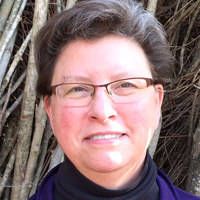At 7:22 a.m. on April 15, 1865, just nine hours after President Lincoln was shot, he died. By the end of that day, thanks to the telegraph, flags all over America were at half-staff. Many Americans, perhaps most, learned about his murder in their local newspaper, posted at the center of town. Americans lined the railroad tracks back to Illinois after the president’s funeral to share their grief and pay tribute.
When my grandfather was a teenager, he rode his bike down to the local drug store for one reason or another where he saw the shocking news of that day: “Titanic Sinks.” Many newspapers got their first reports 100% wrong, reporting that all passengers had been rescued at sea.
When FDR unexpectedly died in 1945, most Americans got the first reports of the news over the radio. That’s where families gathered for news and entertainment – the radio.
In 1963, we learned of President Kennedy’s assassination on television, but only by first news accounts. There was no news coverage of this ordinary drive of a President and Governor of Texas driving through downtown Dallas on a sunny November day. We learned about this murder via Walter Cronkite, dramatically taking off his glasses during a special report, looking at the clock, noting the time and announcing the president’s death followed by the expected arrangements for the vice-president to take the oath of office. The shared experience that I personally associate with Kennedy’s death is his funeral. It was one of the few times that my father parked us in front of our black and white television and insisted we watch – for three long days.
Twenty years ago on a September Tuesday, I went through my unremarkable morning routine, which put me at my computer in the morning. I opened my browser and saw ABC News’s home page describing the World Trade Center attack. For the first time in my then middle-aged life, I’d learned about a devastating national event on my computer. Shortly after seeing the news, I received an email from my uncle in Arizona, asking something about a routine and unrelated subject. My response was immediate and one sentence long:
Turn on your television.
I didn’t say what channel or news network he should watch. As a working journalist at the time, I knew that this event would be the only thing on television for quite some time. Wall-to-wall they call in the broadcast media.
No commercial interruption. No regular programming. Not for a week.
On September 11, 2001, the pristine visibility of a cloudless sapphire sky made it possible for flight school dropouts to steer jumbo jets into buildings, using the fuel laden planes as suicide bombs. While the plane crashes into the Pentagon and into a field in Shanksville, PA were devastating, it was the World Trade Center attack, one commercial jet into each building, in the epicenter of American media and commerce, that was (to that point) the most documented terrorist attack in history.
And we all watched it on television at the same time. The country was utterly united, despite having just gone through the most divisive presidential election in our history. I didn’t vote for George W. Bush, but I wanted more than anything for him to get it right when he addressed the nation that night and the weeks and months following. That’s the power of a shared experience and a national tragedy.
The anniversary of the 9/11 attacks provides a chance to pause and reflect on our current unfolding national tragedy. Daily COVID deaths, almost entirely among unvaccinated people, are rising once again. We are once again averaging more than 100,000 new cases each day. This increases the risk that a more effective variant becomes widespread and deadlier. This threatens all of us – regardless of vaccine status.
Let’s work together to prevent the attack that is right before our eyes, yet invisible. It’s September and the skies are clear. We can do this.
 Jean Bolduc is a freelance writer and the host of the Weekend Watercooler on 97.9 The Hill. She is the author of “African Americans of Durham & Orange Counties: An Oral History” (History Press, 2016) and has served on Orange County’s Human Relations Commission, The Alliance of AIDS Services-Carolina, the Orange County Housing Authority Board of Commissioners, and the Orange County Schools’ Equity Task Force. She was a featured columnist and reporter for the Chapel Hill Herald and the News & Observer.
Jean Bolduc is a freelance writer and the host of the Weekend Watercooler on 97.9 The Hill. She is the author of “African Americans of Durham & Orange Counties: An Oral History” (History Press, 2016) and has served on Orange County’s Human Relations Commission, The Alliance of AIDS Services-Carolina, the Orange County Housing Authority Board of Commissioners, and the Orange County Schools’ Equity Task Force. She was a featured columnist and reporter for the Chapel Hill Herald and the News & Observer.
Readers can reach Jean via email – jean@penandinc.com and via Twitter @JeanBolduc
Chapelboro.com does not charge subscription fees. You can support local journalism and our mission to serve the community. Contribute today – every single dollar matters.


